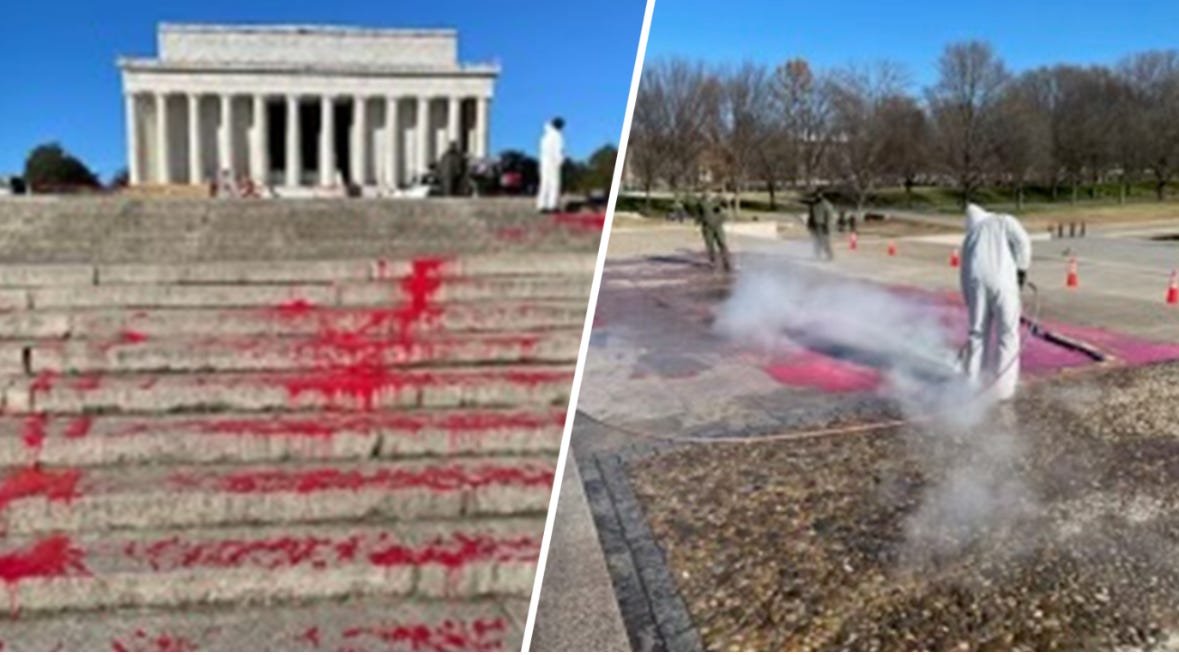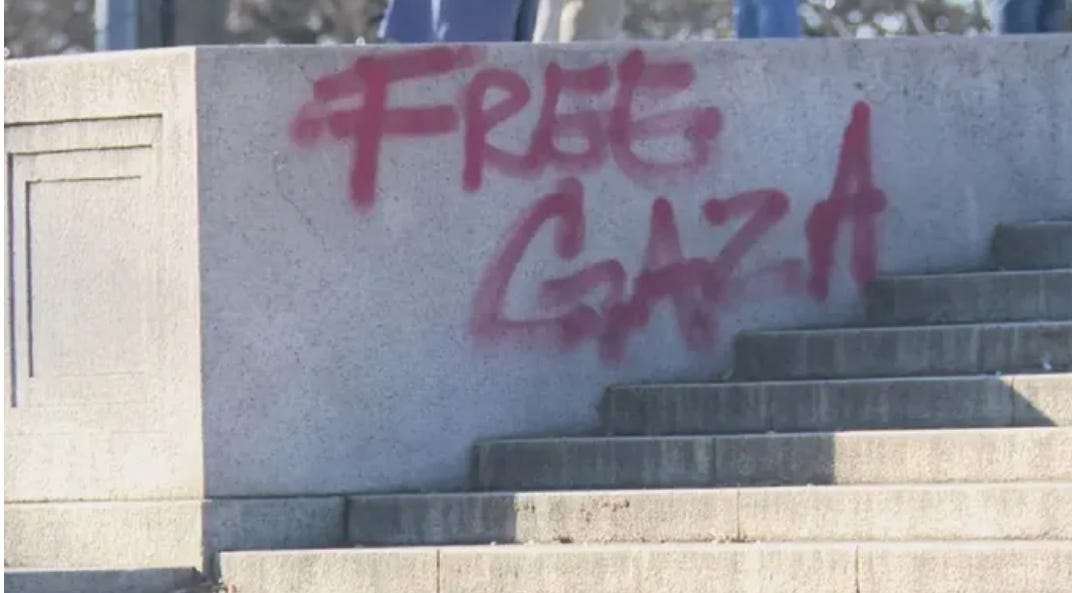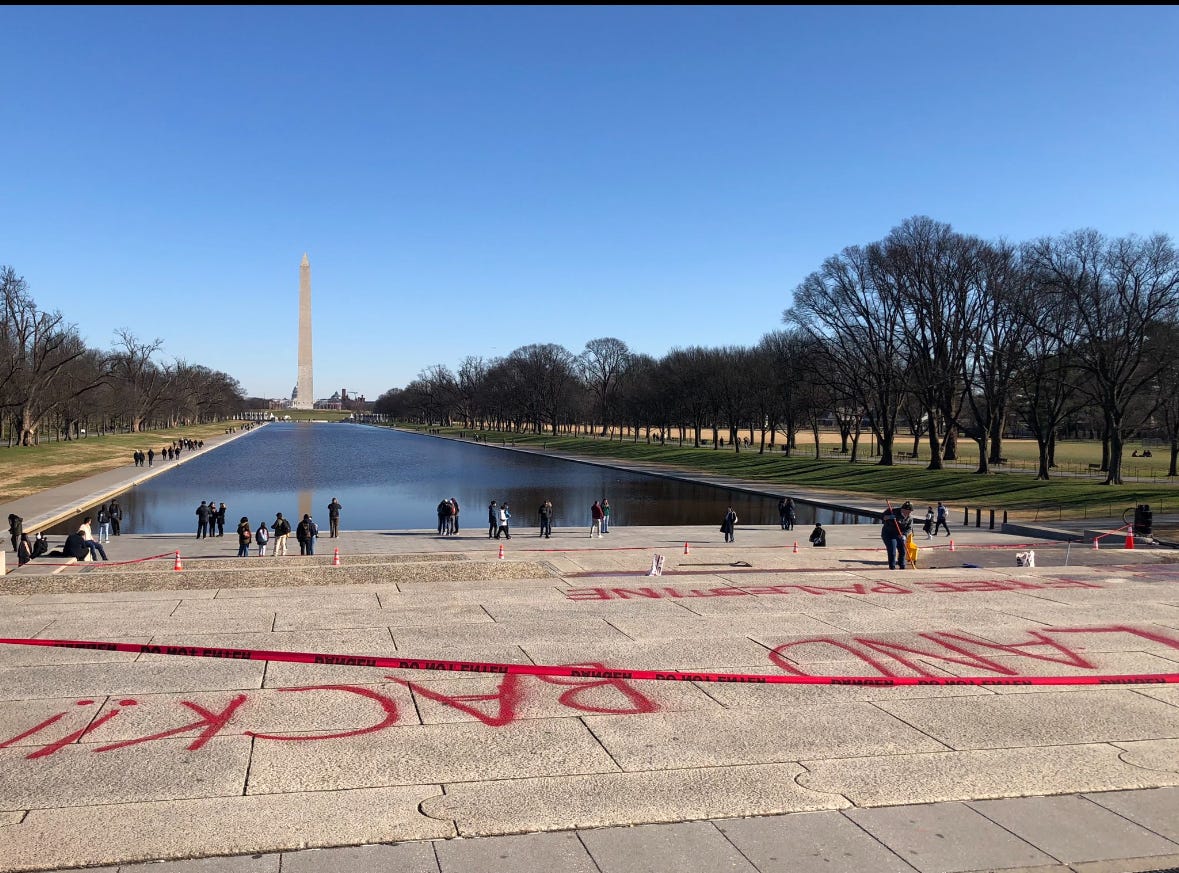Below are images of the Lincoln Memorial, which was desecrated on Monday night in an appalling act of vandalism:
How can it be that the United States Park Police with a budget of hundreds of millions of our tax dollars allowed this to happen? How can a federal law enforcement agency tasked with protecting the nation’s most important monuments fail so miserably and spectacularly? The negligence and dereliction of duty is astounding.
The Lincoln Memorial was dedicated in 1922, 50 years after the Battle of Gettysburg.
Above Abraham Lincoln’s marble likeness there is a dedication which reads:
In This Temple As In The Hearts Of The People For Whom He Saved the Union, The Memory Of Abraham Lincoln Is Enshrined Forever.
The crowd at the dedication was filled with combat veterans of the American and Confederate armies. Robert Todd Lincoln, the president’s son and former United States secretary of war and U.S. ambassador to Great Britain, was there, as was Lincoln Memorial Commission president Chief Justice William Howard Taft. Taft presented the Temple to the people of the United States to President Warren G. Harding, who would be the last commander in chief born during the Civil War.
The keynote speaker at the dedication was Dr. Robert Russa Moton, a Black man, and president of the Tuskegee Institute.
Here is an excerpt from his speech that perfectly explains America’s history and eternal struggle for justice. These words make clear why 50 years later, on August 28, 1963, Dr. Martin Luther King would raise his voice in a moral thunderclap that honored Lincoln, America and humanity. He came to the Lincoln Memorial because it is our most sacred space in America. It is our altar of freedom.
Here is what Dr. Moton said:
When the Pilgrim Fathers landed upon the shores of America in 1620, they laid the foundations of our national existence upon the bedrock of liberty. From that day to this, liberty has been the common bond of our united people. In 1776, the altars of a new nation were set up in the name of liberty. In 1812, in the name of liberty we struck for the freedom of the seas. Again in '61 when the charter of the Nation's birth was assailed, the sons of liberty declared anew the principles of their fathers and liberty became coextensive with the Union. In '98 the call once more was heard and freedom became coextensive with the hemisphere. And as we stand in solemn silence here to-day, there still come rumbling out of the east the slowly dying echoes of the last great struggle to make freedom coextensive with the seven seas. Freedom is the lifebloodof the Nation. Freedom is the heritage bequeathed to all her sons. It is the underlying philosophy of our national existence.
But at the same time, another influence was working within the Nation. While the Mayflower was riding at anchor preparing for her voyage from Plymouth, another ship had already arrived at Jamestown. The first was to bear the pioneers of freedom, freedom of thought and freedom of conscience; the latter had already borne the pioneers of bondage. Here, then, upon American soil within a year met the two great forces that were to shape the destiny of the Nation. They developed side by side. Freedom was the great compelling force that dominated all, and like a great and shining light beckoned the oppressed of every land to the hospitality of these shores. But slavery like a brittle thread was woven year by year into the fabric of the Nation's life.
And how shall we account for it, except it be that in the Providence of God the black race in America against its will was thrust across the path of the onward-marching white race to demonstrate not only for America but for the world whether the principles of freedom were of universal application and ultimately, no doubt, extend its blessings to all the races of mankind.
In the process of time, as was inevitable, these great forces of liberty and the forces of bondage from the ships at Plymouth and Jamestown met in open conflict upon the field of battle. And how strange it is, through the same overruling Providence, that children of those who bought and sold their fellows into bondage should be among those who cast aside ties of language, of race, of religion, and even of kinship in order that a people not of their own race, nor primarily of their own creed or color, should have the same measure of liberty and freedom which they themselves enjoyed.
What a costly sacrifice upon the altar of freedom! How costly the world can never know nor justly estimate. The flower of the Nation's manhood and the accumulated treasure of two centuries of unremitting toil were offered up; and at length, when the bitter strife was over, when the marshaled hosts on both sides had turned again to broken desolated firesides, a cruel fate, unsatisfied with the awful toll of four long years of carnage, struck at the Nation's head and brought to the dust the already wearied frame of him whose patient fortitude, whose unembittered charity, whose never failing trust in the guiding hand of God had brought the Nation weltering through a sea of blood, yet one and indivisible, to that peace for which his heart yearned. On that day Abraham Lincoln laid down his life for America—the last and costliest sacrifice.
President Harding spoke to the nation after Dr. Moton. His voice was carried across 48 states on the new invention of radio. Below is what he said about the savior of the Union. The most important point he makes is his last: the Lincoln Memorial was built for us and our children, not for those of Lincoln. It is a reminder that no matter how dark things may seem in America, no matter how hard the struggle may be, the United States of America will endure. The Lincoln Memorial is a marker for all of the world that freedom will triumph, and America will always be free. The Lincoln Memorial is not a monument to national perfection, but rather its glorious imperfections. It is a summons towards patriotism, Americanism and the perpetuity of union.
Lincoln’s faith was inspiring, his resolution commanding, his sympathy reassuring, his simplicity enlisting, his patience unfailing. He was faith, patience and courage, with his head above the clouds, unmoved by the storms which raged about his feet.
President Harding said the following in his address at the dedication:
No leader was ever more unsparingly criticized or more bitterly assailed. He was lashed by angry tongues and ridiculed in press and speech until he drank from as bitter a cup as was ever put to human lips, but his faith was unshaken and his patience never exhausted. Some one sent me recently an illumined and framed quotation which fell from his lips when the storm of criticism was at its height:
"If I were trying to read," he said, "much less answer all the attacks made on me, this shop might as well be closed for any other business. I do the best I know how, the very best I can; and I mean to keep on doing it to the end. If the end brings me out all right, what is said against me will not amount to anything. If the end brings me out all wrong, ten angels swearing I was right would make no difference."
He knew, of course, before the assassin robbed him of fuller realization, that the end was bringing him out all right. He knew when swords were sheathed and guns laid down, that the union he saved was riveted anew and made forever indissoluble. He knew that in the great crucible of fire and blood the dross had been burned from the misdirected patriotism of seceding states and the pure gold restored to shining stars in dear Old Glory again. He knew he had freed a race of bondmen and had given to the world the costly proof of the perpetuity of the American union. But I cannot restrain the wish that he might somehow know of the monuments to his memory throughout the world, and that we are dedicating today, on behalf of a grateful nation, this matchless memorial, whose forty-eight columns, representing forty-eight states in the concord of union, testify that the "end brought him out all right".
Reflecting now on the lampooning and heedless attack and unjustifiable abuse which .bruised his heart and tested his patience, we may accept its expression as one of the abused privileges under popular government, when passion sways and bitterness inspires, but for which there is compensation in the assurance that when men have their feet firmly planted in the right, and do the very best they can and "keep on doing it", they come out all right in the end, and all the storm does not amount to anything.
He rose to colossal stature in a day of imperiled union. He first appealed, and then commanded, and left the union secure and the nation supreme. His was a leadership for a great crisis, made loftier because of the inherent righteousness of his cause and the sublimity of his own faith. Washington inspired belief in the republic in its heroic beginning, Lincoln proved its quality in the heroic preservation. The Old World had wondered about the New-World experiment, and was quite ready to proclaim its futility when the civil war was threatening; but Lincoln left the union unchallenged for all succeeding time. Not only was our nation given a new birth of freedom, but democracy was given a new sanction by that hand of divinity itself which has written the rights of humankind and pointed the way to their enjoyment.
Abraham Lincoln was no superman. Like the great Washington, whose monumental shaft towers nearby as a fit companion to the memorial we dedicate today, the two testifying the grateful love of all Americans to founder and savior—like Washington, Lincoln was a very natural human being, with the frailties mixed with the virtues of humanity. There are neither supermen nor demi-gods in the government of kingdoms, empires, or republics. It will be better for our conception of government and its institutions if we will understand this fact. It is vastly greater than finding the superman if we justify the confidence that our institutions are capable of bringing into authority, in time of stress, men big enough and strong enough to meet all demands.
Washington and Lincoln offered outstanding proof that a representative popular government, constitutionally founded, can find its own way to salvation and accomplishment. In the very beginning our American democracy turned to Washington, the aristocrat, for leadership in revolution, and the greater task of founding permanent institutions. The wisdom of Washington and Jefferson and Hamilton and Franklin was proven when Lincoln, the child of privation, of hardship, of barren environment and meager opportunity, rose to unquestioned leadership when disunion threatened.
Lincoln came almost as humbly as The Child of Bethlehem. His parents were unlettered, his home was devoid of every element of culture and refinement. He was no infant prodigy, no luxury facilitated or privilege hastened his development, but he had a God-given intellect, a love for work, a willingness to labor and a purpose to succeed.
Biographies differ about his ambition, but Herndon, who knew him as did no other, says he was greatly ambitious. I can believe that. Ambition is a commendable attribute, without which no man succeeds. Only inconsiderate ambition imperils.
Lincoln was modest, but he was sure of himself, and always greatly simple. Therein was his appeal to the confidence of his country. When he believed he was right a nation believed him to be right, and offered all in his support.
His work was so colossal, in the face of such discouragement, that none will dispute that he was incomparably the greatest of our presidents. He came to authority when the republic was beset by foes at home and abroad, and reestablished union and security. He made that gesture of his surpassing generosity which began reunion. Let us forget the treachery, corruption, and incompetence with which he had to combat, and recall his wisdom, his unselfishness, his sublime patience.
He resented no calumnies upon himself; he held no man his enemy who had the power and will to serve the union, his vision was blinded by no jealousy. He took his advisers from among his rivals, invoked their patriotism and ignored their plottings. He dominated them by the sheer greatness of his intellect, the singleness and honesty of his purpose, and made them responsive to his hand for the accomplishment of the exalted purpose. Amid it all there was a gentleness, a kindness, a sympathetic sorrow, which suggest a divine intent to blend mercy, with power in supreme attainment.
This memorial, matchless tribute that it is, is less for Abraham Lincoln than for those of us today, and for those who follow after.
Flanking Abraham Lincoln are the two greatest speeches ever delivered by an American president. They were written by Lincoln’s hand. The first is the Gettysburg Address and the second is the second inaugural address. Read these speeches and absorb them, while understanding these words were defaced on Monday night as well.
There is something that must be understood in this moment of national crisis: the majority will never yield to a seething, menacing minority that demands power or disunion. Donald Trump will not destroy what was saved by Abraham Lincoln and redeemed by Dr. Martin Luther King.
If you doubt me, go visit the Lincoln Memorial after the U.S. Park Police clean up the mess.








The anger I'm seeing over the past few years is very unsettling. It didn't necessarily begin with TFG, but it sure escalated under him. I could point to many instances in which this anger began, but would be hard pressed to single out any one instance. Just in my small Southern California community a couple of nights ago, there was a very heartbreaking incident of anger, not sure what to call it. A local woman has been donating a Christmas tree for 16 years and setting it up along our popular beach trail. Over those 16 years, the community has added ornaments - many celebrating the lives of their loves ones or pets who have passed on. Or celebrating their families and the birth of a baby. Some of the ornaments are generic, but placed on that tree with love. The woman saves the ornaments and puts some of them back on the tree every year. She has accumulated many mementoes over the years. Two nights ago, some asshole or more, decided it would be fun to set the tree on fire. It burned to a stick, destroying most of the ornaments. What would lead someone to do such a thing? Getting some sort of kicks taking away something that brought so much joy to our community? Well, this community has rallied and two smaller trees have been set up and ornaments are appearing. I'm hoping someone saw something, or overheard someone bragging and the little shits are caught. In the spirit of the season, I just wish we could set aside our anger and bask in peace and love. I don't think it's too much to ask.
I was born in DC and still live in the DMV. There are cameras everywhere. It is beyond belief how such an act of vandalism could be perpetrated at and on the Lincoln Memorial with no intervention. It didn't take 30 seconds to pull off, you know? If I'm not mistaken, while national monuments are protected by the Park Police, there are at least three other police forces in DC. And nobody saw?! Give me a break!